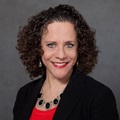Compounding Chief Departing US FDA After Leading Office Through 'Tumultuous Times'
Executive Summary
Julie Dohm, who led a wide range of initiatives to bolster FDA's oversight of compounding pharmacies, will be joining Covington & Burling after leaving the agency March 29. A replacement has not yet been announced.
Julie Dohm, the senior science advisor for compounding who serves as the US FDA lead on compounding and has helped to spearhead a wide range of initiatives to enforce the Drug Quality and Security Act (DQSA,) will be leaving the agency on March 29. She has been credited with her steady leadership in guiding the agency's compounding office through a difficult time.
Dohm will be joining the law firm of Covington & Burling. A replacement at FDA has not yet been announced.
Since becoming the lead for FDA’s drug compounding initiative in 2016, Dohm has “made significant progress with the agency’s compounding goals," including clarifying responsibilities of FDA and the states, CDER Director Janet Woodcock said in a staff memo regarding Dohm’s departure that the agency released March 21.
Woodcock further credits Dohm with advancing numerous compounding policies, including convening five Pharmacy Compounding Advisory Committee meetings, issuing 17 guidance documents for industry, and four rules on such topics as compounding copies of FDA-approved products; insanitary conditions at compounding facilities; and mixing, diluting, and repackaging biological products.
FDA's most recent actions include banning two bulk drug substances, vasopressin and nicardipine hydrochloride, from the list of bulk drug substances that outsourcing facilities can use to compound drugs; the agency also recently issued final guidance addressing its policies for developing the 503B bulks list. (Also see "FDA Begins Restricting Bulk Compounding With First DQSA Determinations" - Pink Sheet, 6 Mar, 2019.)
The ban has has already landed the agency in court. (Also see "Athenex Sues FDA To Get Vasopressin On List Of Drugs That Can Be Compounded" - Pink Sheet, 20 Mar, 2019.)
In addition to policy setting, Dohm has “successfully overseen efforts to identify compounding facilities that present the greatest risks of harm to patients, as well as efforts to take appropriate action when violations of the law are identified,” Woodcock said.
Between FY 2016 and FY 2018, FDA conducted more than 400 compounding inspections, issued more than 160 warning letters, and oversaw more than 140 recalls. During this period, the Department of Justice and FDA entered into five consent decrees of permanent injunctions with compounders and criminally prosecuted multiple compounders, including those involved in the 2012 fungal meningitis outbreak, according to Woodcock's memo.
More than half of the drug GMP warning letters FDA issued in 2016 went to compounding pharmacies as US FDA's crackdown on poor aseptic practices in sterile compounding continued. (Also see "FDA GMP Warning Letters Review: Compounding Pharmacies Drew The Most Letters In 2016" - Pink Sheet, 28 Apr, 2017.)
Many of FDA's stepped-up efforts in compounding are driven by the 2013 Drug Quality and Security Act (DQSA), the law which established a new category of outsourcing facilities that must follow federal cGMP requirements following the deadly outbreaks of fungal meningitis from compounded drugs produced by the New England Compounding Center.
Woodcock further noted that Dohm “effectively” conducted outreach to stakeholders and instituted collaborations with external partners. These included collaborations with the University of Maryland and the Johns Hopkins University to help the agency develop lists of bulk drug substances that may be used in compounding. Most recently, FDA secured congressional appropriations to create a Center of Excellence on Compounding for Outsourcing Facilities.
Before coming to CDER to lead FDA's compounding efforts, Dohm served on detail as a drugs counselor in the Office of Chief Counsel (OCC), advising CDER on legal issues relating to generic drugs and biosimilars. For most of her tenure in OCC, she was a civil litigator, representing FDA with the Department of Justice in affirmative, defensive, and third-party litigation at the trial and appellate levels.
Elizabeth Jungman, the director of public health programs for The Pew Charitable Trusts, said that Dohm “led FDA’s compounding shop through a tumultuous time, and set the agency on a path for implementing the DQSA in a way that preserves access to compounded products for patients who need them, while ensuring that those products are safe. The safety of those patients now depends on the agency staying the course, and continuing robust implementation of the DQSA’s protections.”
Gus Bassani, the chief scientific officer of the Professional Compounding Centers of America, said Dohm “is a well-respected colleague, and someone who was always willing to work collaboratively with those involved in the compounding pharmacy industry. We at PCCA look forward to learning who her successor will be, so we can continue to foster open and productive dialogue with the FDA to ensure the safest and highest-quality compounded medications are available for all patients.”
